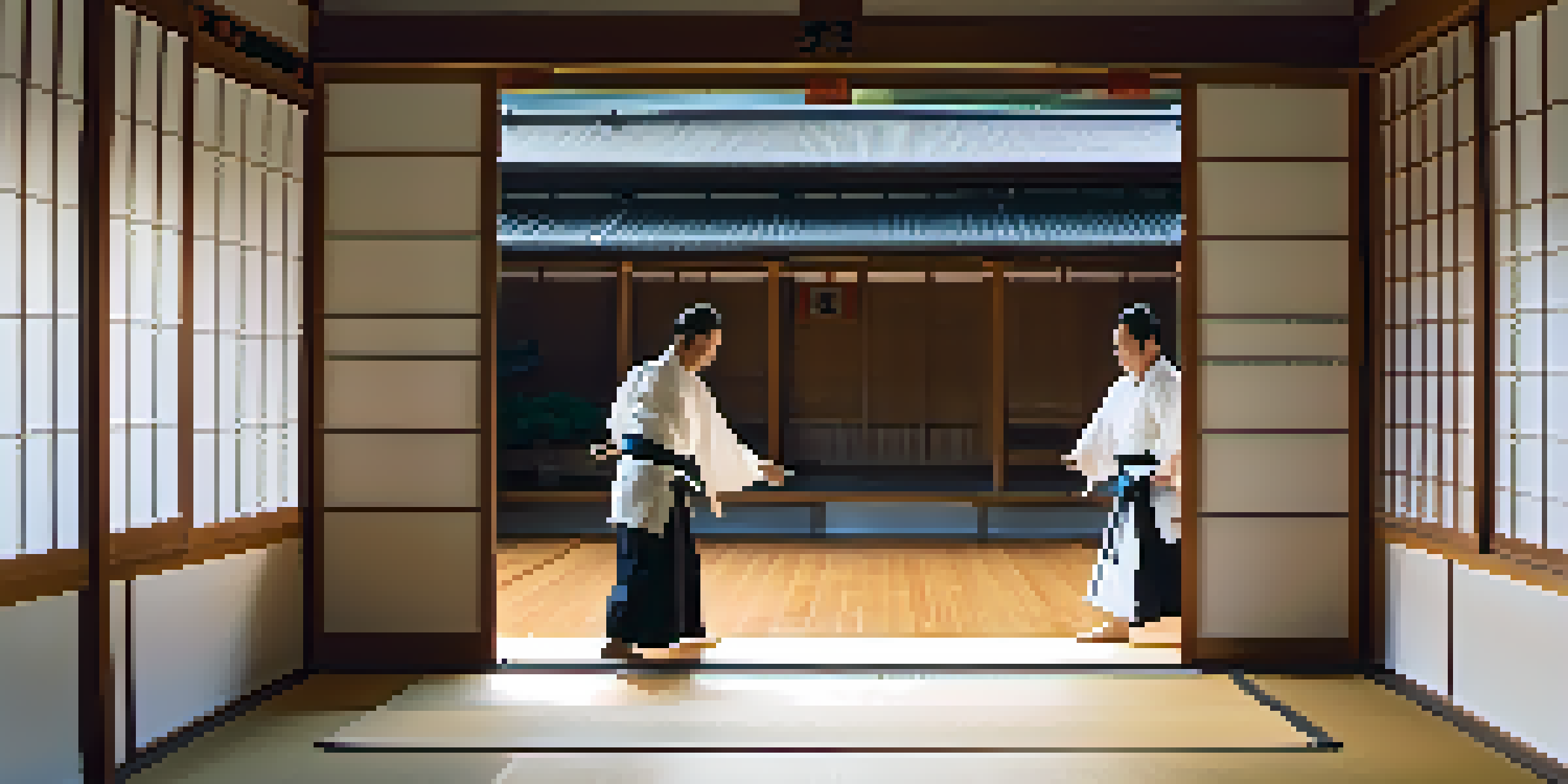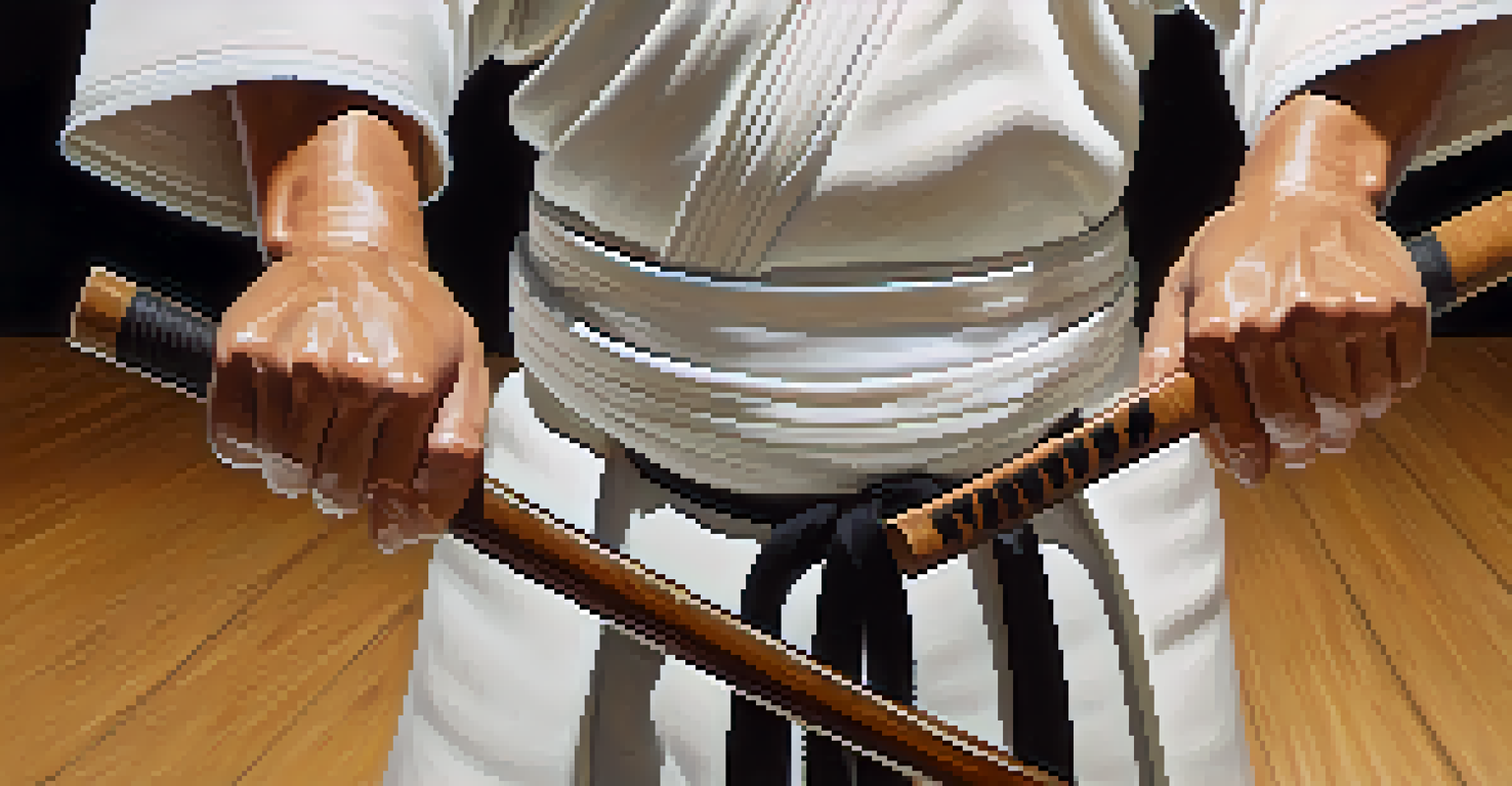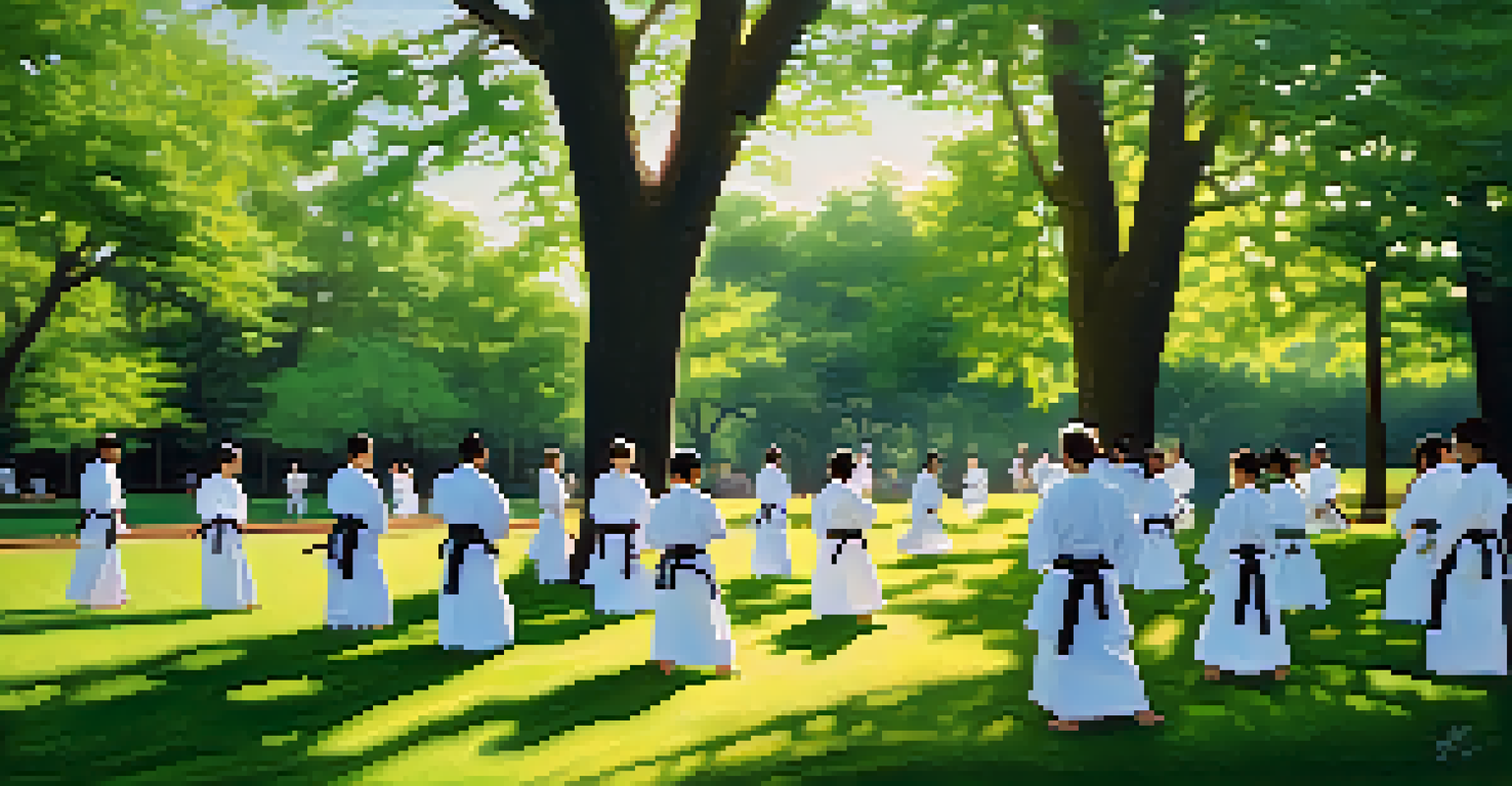Self Defense and Conflict Resolution in Aikido Philosophy

Aikido: More Than Just a Martial Art
Aikido is often perceived as just another martial art, but its philosophy runs much deeper. At its core, Aikido emphasizes harmony and peace rather than brute strength. This unique approach encourages practitioners to redirect energy rather than meet force with force, promoting a mindset of resolution rather than conflict.
The ultimate aim of Aikido is not to defeat an opponent but to resolve conflict peacefully.
In Aikido, the goal is not to defeat an opponent but to resolve the conflict peacefully. This perspective makes Aikido distinct and relevant in discussions around self-defense and conflict resolution. It helps practitioners understand that true strength lies in maintaining composure and balance in challenging situations.
Additionally, Aikido teaches that every conflict can be an opportunity for growth and learning. By embracing this philosophy, individuals can cultivate a sense of inner peace that influences not just their physical responses but their emotional and mental approaches to conflict.
The Principles of Aikido: Defense without Aggression
One of the fundamental principles of Aikido is the idea of defense without aggression. Instead of responding to an attack with hostility, Aikido encourages practitioners to blend with the attacker’s movement. This method not only neutralizes the threat but also allows for a graceful resolution to the encounter.

This principle reflects a broader philosophy applicable to everyday life. In situations of conflict, whether personal or professional, responding with understanding rather than aggression can lead to more constructive outcomes. Aikido teaches us to navigate disagreements with poise, ultimately promoting a peaceful resolution.
Aikido Promotes Peaceful Conflict Resolution
Aikido emphasizes redirecting energy and fostering harmony rather than meeting aggression with aggression.
Moreover, practicing these principles in Aikido can lead to increased self-awareness and emotional intelligence. As individuals become more attuned to their reactions and those of others, they can better manage conflicts in various aspects of their lives, from family dynamics to workplace disputes.
Mindfulness and Presence in Aikido Practice
Mindfulness is a crucial aspect of Aikido that enhances conflict resolution. Practitioners are encouraged to be fully present in the moment, fostering an awareness of their surroundings and emotions. This heightened state of awareness can help individuals respond rather than react in stressful situations.
In the middle of difficulty lies opportunity.
Being mindful allows Aikido practitioners to assess conflicts more clearly, understanding the motivations behind an attack or disagreement. This insight is invaluable when navigating interpersonal tensions, as it enables a compassionate approach to resolution—one that considers the needs of all parties involved.
Furthermore, this practice of mindfulness extends beyond the dojo. By integrating these techniques into everyday interactions, individuals can create a more harmonious environment, reducing the likelihood of conflicts escalating into confrontations.
The Role of Compassion in Conflict Resolution
Compassion is a core tenet of Aikido philosophy, guiding practitioners in how they approach conflict. Rather than viewing an attacker as an enemy, Aikido encourages us to see them as a person in pain or distress. This shift in perspective can significantly influence how we handle confrontations.
When compassion is at the forefront, responses shift from defensive mechanisms to understanding and empathy. By recognizing the humanity in others, individuals can defuse potential conflict and foster a dialogue that prioritizes resolution over winning. This approach is vital in both Aikido practice and daily life.
Mindfulness Enhances Conflict Management
Practicing mindfulness in Aikido helps individuals respond thoughtfully to conflicts, promoting understanding over reaction.
Ultimately, by embracing compassion, Aikido practitioners learn to create connections even in conflict. This not only enhances personal relationships but also contributes to a more peaceful community, where conflicts are seen as opportunities for understanding rather than battles to be won.
Aikido Techniques: Tools for Conflict Resolution
The physical techniques of Aikido serve as practical tools for conflict resolution. Moves like the irimi (entering) and tenkan (turning) illustrate how to redirect an opponent's energy rather than confront it head-on. These techniques can be metaphorically applied to life’s conflicts, teaching us how to navigate challenges with grace.
By mastering these movements, practitioners develop better coordination and awareness, which translates into improved conflict management skills. The ability to remain calm and composed, even in the face of aggression, can help shift the dynamics of any confrontational situation.
Moreover, these techniques emphasize the importance of balance—both physically and emotionally. A balanced approach to conflict allows individuals to maintain their integrity while also respecting the perspectives of others, creating a more conducive environment for resolution.
Aikido and Personal Empowerment
Engaging in Aikido fosters a sense of personal empowerment that is crucial in both self-defense and conflict resolution. As practitioners learn to defend themselves through non-aggressive means, they gain confidence in their abilities. This newfound confidence translates into everyday situations, enabling individuals to assert themselves calmly and effectively.
Empowerment in Aikido also stems from understanding one's limits and strengths. Knowing when to engage and when to retreat can be incredibly powerful in avoiding unnecessary conflicts. This self-awareness is a vital skill that can enhance personal and professional relationships.
Compassion is Key to Aikido Philosophy
Aikido teaches that seeing others as individuals in distress allows for empathy and constructive dialogue in conflicts.
Ultimately, Aikido teaches that true empowerment is rooted in self-control and respect for others. As individuals embody these principles, they can navigate not only physical confrontations but also the emotional complexities of life with a sense of strength and integrity.
Integrating Aikido Philosophy into Daily Life
The principles of Aikido can be integrated into everyday life, making its teachings universally applicable. By adopting a mindset of harmony and non-aggression, individuals can enhance their interactions and relationships. Simple practices, like active listening and empathy, can transform how we respond to conflicts.
Incorporating Aikido philosophy into daily routines also promotes overall well-being. Regularly practicing mindfulness and compassion can lead to reduced stress and improved emotional health. These practices can create a ripple effect, influencing those around us to adopt similar approaches.

By making Aikido a part of our daily lives, we contribute to a culture of peace and understanding. This not only enriches our personal experiences but also fosters a sense of community where conflicts are resolved constructively, embodying the very essence of Aikido.